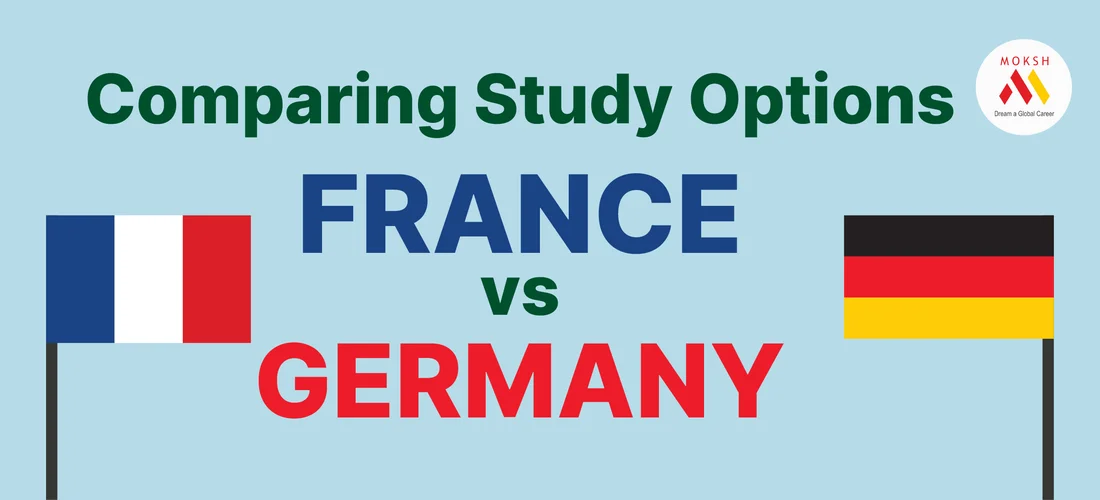
So, you've chosen to study in Europe—a fantastic decision! But which country should you select: France or Germany? Both have advantages and disadvantages, making it essential to find the one that best suits your needs.
Why Study in Europe?
Studying in Europe opens doors to many world-renowned universities, diverse programs, and vibrant cities; Europe provides a stimulating environment for personal and professional growth. The innovative research opportunities and dynamic job markets make it an attractive destination for international students.
This blog will explore and compare these two countries to help you choose your academic destination. Let’s dive in.
France vs. Germany: A Side-by-Side Comparison for International Students
This table summarizes critical factors to consider when choosing between studying in France or Germany:
| Factor | France | Germany |
|---|---|---|
| Tuition Fees (Public Universities) | €2,700 (Bachelor's) / €3,700 (Master's) per year (average) | Free (tuition-free universities in Germany) |
| Tuition Fees (Private Universities) | Up to €20,000 per year | Up to €20,000 per year |
| Cost of Living (excluding rent) | €800-900 per month (average) | €800-1200 per month (average) |
| Admission Rate (Public Universities) | Not Available | 30% (average) |
| Work Permit Hours (per year) | 964 hours | 120 whole days (40 hours/week) or 240 half days (20 hours/week) |
| Student Visa Requirements | Proof of return ticket, financial resources | Mandatory health insurance, proof of funds in a blocked account (Germany blocked account for student visa) |
| Post-Graduation Stay for Job Search | Up to 1 year | Up to 18 months |
| Visa Options for Extended Stay | Special 5-year work visa (Master's or PhD required) | EU Blue Card (highly skilled or above 1.5x minimum wage) |
| Number of International Students | 370,000 (international students in France) | 350,000 (international students in Germany) |
| Healthcare System | Excellent automatic coverage for students | Mandatory public health insurance (€110/month) |
| Job Market for International Students | Difficult fluency in French helps | More open to non-German speakers, especially in major cities |
| Weather | Mild and temperate | Favorable conditions |
France and Germany offer distinct advantages when considering higher education opportunities in Europe. Both countries are renowned for their academic excellence and diverse program offerings, but they differ in language of instruction, post-study work opportunities, and job market dynamics. The following table provides a comparative overview of key aspects related to studying and working in these two countries:
| Category | France | Germany |
|---|---|---|
| Language of Instruction | Primarily French, with some Master's programs offered in English, especially in Business and Engineering. | Mainly German, but many English-taught Master's programs are available, particularly in Engineering, Sciences, and Business. |
| Post Study Work Permit | Temporary Residence Permit (titre de séjour) allows graduates to stay and seek employment for up to 18 months after graduation. | A post-study work visa permits graduates to stay for 18 months and find a job related to their field of study. |
| Job Market | Strong in luxury goods, Aerospace, finance, and automotive sectors. Critical roles for Indian graduates include engineers, IT professionals, and business analysts. French language skills are crucial for employment. | There is a robust job market in engineering (especially automotive), IT, and manufacturing. Germany offers significant opportunities for skilled Indian graduates in these fields. |
| Popular Programs | Notable for Business & Management, Engineering (particularly Aerospace), Luxury Goods Management, Fashion Design, and esteemed Humanities and Social Sciences programs. | Renowned for Engineering (especially Automotive & Mechanical), Sciences (Natural Sciences & Mathematics), and Business programs focusing on innovation and technology. |
| University Rankings | 39 French universities are featured in the QS World University Rankings 2024. | 51 German universities are featured in the QS World University Rankings 2024. |
Conclusion
Choosing between studying in France or Germany offers unique opportunities tailored to different academic and career goals. France excels in cultural and luxury-related programs, with a strong emphasis on French language skills for employment. Germany stands out for its innovative approach and tuition-free public universities, with significant opportunities for international students in Engineering and IT. Both countries offer excellent education, but your decision should align with your language proficiency, field of interest, and financial considerations.
For personalised guidance and support throughout this process, MOKSH Counsellors can assist you in making an informed choice and navigating the complexities of studying abroad. Their expertise ensures you find the best fit for your academic and career aspirations in Europe.






.webp)
